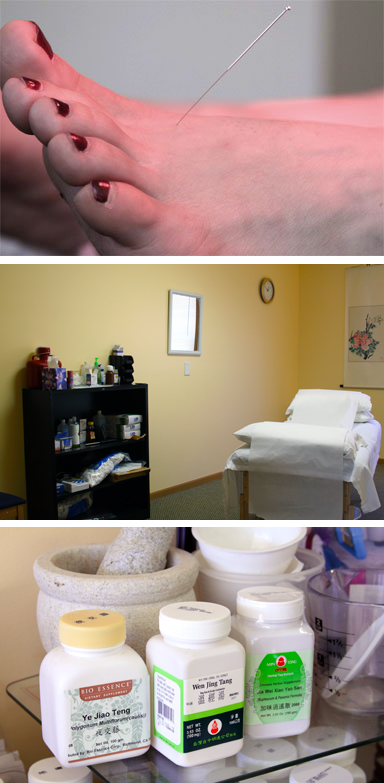
HOW ACUPUNCTURE WORKS
Acupuncture is a therapy that involves insertion of very fine sterile needles into various acupuncture points to stimulate the body to rid itself of disease. Side effects are minimal. Acupuncture is based on the concept of qi (pronounced "chee"), which, loosely defined, means energy and its effect on the physiological function and health of the body.
Qi flows through 14 different meridians in the body, nourishing organs and structures along its path. Qi is balanced when the body is in good health. When a symptom arises, it is because the free flow of energy has become obstructed. The aim of acupuncture is to remove these obstructions. The acupuncture point is a precise anatomical location where the energy can be contacted by inserting the needle. By stimulating these points, acupuncturists seek to restore normal energy flow, and stimulate the body's ability to heal itself. Acupuncturists often use other traditional healing methods, such as Chinese herbs, moxibustion,and dietary therapy.
Although the mechanisms of acupuncture remain unclear when interpreted by modern Western Medical science, recent studies have shown that acupuncture can increase naturally occurring substances in the body that facilitate healing and maintain the body's internal balance. For instance, release of neural transmitters such as endorphins and enkephalins block pain sensory pathways to eliminate pain, elevate mood, and create deep relaxation. Stimulation by acupuncture may also activate the hypothalamus and pituitary gland, resulting in a broad spectrum of systemic effects. Research shows that acupuncture can affect most of the body's systems including the nervous system, muscles, hormones, circulation, antibody production, and allergic responses, as well as the respiratory, digestive, urinary, and reproductive systems.
WHAT CONDITIONS CAN BE TREATED BY ACUPUNCTURE?
There are many conditions that can be treated successfully by acupuncture. The World Health Organization recognizes acupuncture's effectiveness in treating over 200 conditions. The most common ailments currently being treated are: Chronic Pain, Arthritic Conditions, Headaches (including Migraine), Neuromusculoskeletal problems, Fibromyalgia, chemical dependency, Allergic Reactions, relief of muscle spasms, anxiety disorders and depression, insomnia, nausea from chemotherapy, pregnant related nausea, relief of PMS and painful menstruation, and menopause related symptoms.
The most common ailments currently being treated are:
Chronic Pain, Arthritic Conditions, Headaches (including Migraine), Neuromusculoskeletal problems, Fibromyalgia, chemical dependency, Allergic Reactions, relief of muscle spasms, anxiety disorders and depression, insomnia, nausea from chemotherapy, pregnant related nausea, relief of PMS and painful menstruation, and menopause related symptoms.
DOES ACUPUNCTURE HURT?
No, it bears no resemblance at all to getting a shot since the main source of pain from an injection is the large diameter of the needle and the pressure of the medicine being forced into the tissue. By contrast acupuncture needles are very fine and flexible. They are about the diameter of a human hair. In most cases, there is no discomfort.
If the correct stimulus of the needle has been obtained, you should feel a slight sensation as the needle contacts the qi. This feeling is known as 'deqi', or getting qi. The sensation can either be a dull ache, a numbness, a tingling , or a sensation of heat. In some instances the sensation travels along the line of the meridian and can affect whole areas of the body or limbs. Most people find the treatments very relaxing.
